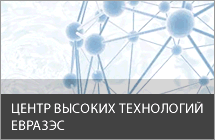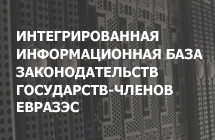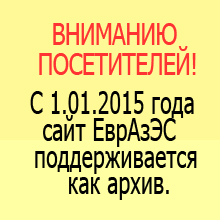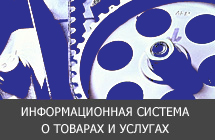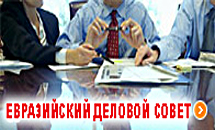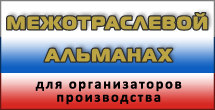|
REGULATIONS on the Integration Committee of the Eurasian Economic Community APPROVED by Resolution of the EurAsEC Interstate Council 31 May 2001, No. 6
REGULATIONS on the Integration Committee of the Eurasian Economic Community (as amended on 27 April 2003, and 23 June 2006)
Chapter I. general provisions
1. Pursuant to Article 6 of the Treaty on the Establishment of the Eurasian Economic Community signed on October 10, 2000, the Integration Committee of the Eurasian Economic Community (hereinafter the Integration Committee) is a standing body of the Eurasian Economic Community (hereinafter EurAsEC or the Community). The Integration Committee reports on its performance to the Interstate Council of EurAsEC (the Interstate Council). 2. Pursuant to Article 3 of the Treaty on the Establishment of EurAsEC and consistent therewith, the Integration Committee of EurAsEC undertakes the functions of the Integration Committee of the Republic of Belarus, the Republic of Kazakhstan, the Kyrgyz Republic, the Russian Federation, and the Republic of Tajikistan, which was set up by the Treaty on increased integration in the economic and humanitarian fields of 29 March 1996 between the Republic of Belarus, the Republic of Kazakhstan, the Kyrgyz Republic, and the Russian Federation. 3. The Integration Committee consists of Deputy Heads of Government of EurAsEC member states. 4. Meetings of the Integration Committee are conducted at least once in three months. Extraordinary meetings can be convened by initiative of any EurAsEC member state or the Chairman of the Integration Committee, or by resolution of the Interstate Council.
Chapter II. FUNCTIONS
5. For accomplishing tasks and objectives of the Community, the Integration Committee performs the following functions: – analysis of the status and development trends of integration processes in the Community, preparation of proposals for their promotion, including the development and coordination of appropriate draft treaties and resolutions by EurAsEC organs; – review of issues, coordination and introduction to the Interstate Council draft resolutions regarding: regulation of conditions of mutual trade among EurAsEC member states; customs policy of the Community in relation to third states; harmonization of the national legislation of EurAsEC member states; mutual relationships of EurAsEC with third states and international institutions; simplification and unification of customs regulations and procedures applicable in the Community member states; preliminary consideration of international investment projects, economic, social and other mutual programs and plans of the member states within the framework of the Community, and presentation of draft resolutions to the Interstate Council; cooperation between EurAsEC organs and governments of the Community member states; control over the implementation of resolutions issued by the Interstate Council and the Integration Committee as well as the international treaties effective within the framework of the Community; – prepare, co-ordinate and introduce to the Interstate Council proposals on the agendas of Interstate Council meetings and the level at which these should be held, as well as draft resolutions and documents; – submit to the Interstate Council the Annual Community Status and Progress Report and the Integration Committee Performance Report; – consider inquiries and recommendations by the Interparliamentary Assembly; – inform the Interparliamentary Assembly on progress achieved by the Community in accomplishing tasks and objectives; – consider the Community draft budget for the forthcoming budget year submitted by the Secretary General, approved by the Commission of Permanent Representatives and drawn up with the participation of the Interparliamentary Assembly, the Community Court and other EurAsEC organs, and present it to the Interstate Council for approval after coordination with Governments of EurAsEC member states; – exercise control over EurAsEC budget implementation by the Community organs and submit an appropriate annual report to the Interstate Council for approval; – propose that the Interstate Council suspend or terminate the participation of a member state in EurAsEC organs on grounds provided for by Article 9 of the Treaty on the Establishment of EurAsEC, or propose admission to Community membership; – propose that the Interstate Council establish and/or close missions of the Integration Committee of EurAsEC; – propose that the Interstate Council appoint a Secretary General or relieve him from office; – approve, on a proposal by EurAsEC member states, candidacy for posts in the Secretariat of the Integration Committee in accordance with quotas established for each member state, and adopt resolutions to relieve them from their offices; – within its competence, support and develop contacts with executive organs of other international institutions, and as instructed by the Interstate Council, represent the interests of the Community in relationship to other international entities; – propose that the Interstate Council qualify a state or an international institution as an observer with EurAsEC in case of an appropriate appeal; – perform depository functions pertaining to treaties signed within the framework of EurAsEC and to resolutions issued by the Interstate Council, and authorize the Secretary General to ensure performance of these functions; – perform other functions as instructed by the Interstate Council. 6. The Integration Committee is entitled to make recommendations to the Interstate Council, recommendations and inquiries to the Interparliamentary Assembly and to Governments of EurAsEC member states, and inquiries to the Court of Justice of the Community. 7. Plenipotentiary representatives of states and international institutions granted the status of observers with EurAsEC may participate in meetings of the Integration Committee and obtain information on resolutions made by the Integration Committee. 8. If needed the Integration Committee proposes that the Interstate Council set up subsidiary organs of the Community to accomplish its tasks and objectives. The Integration Committee may establish commissions and councils for specific joint tasks. 9. Seats of the Integration Committee are Almaty (the Republic of Kazakhstan) and Moscow (the Russian Federation). Meetings of the Integration Committee may be conducted in any member state of EurAsEC. 10. Conditions of residency of the Integration Committee and its representations in host states are defined by agreements between a host state and the Eurasian Economic Community. 11. Activities of the Integration Committee including its meetings, meetings of the Commission of Permanent Representatives, and activities of the Secretariat are financed from the Community budget. 12. The Integration Committee is a legal person.
WORK ORGANISATION
13. The first meeting of the Integration Committee is presided over by its Chairman appointed by the Interstate Council. Further meetings of the Integration Committee will be presided over alternately, in the order of the Russian alphabet, by each member state of the Community, for one year, with the Chairman of the Integration Committee being a representative of the same state as the Chairman of the Interstate Council. 14. The Chairman of the Integration Committee presides over its meetings and participates in meetings of the Interstate Council. 15. If the active Chairman of the Integration Committee cannot preside over a meeting of the Integration Committee, his functions shall be assumed by another representative of the government of the member state chairing the Community at the period. If powers of the Deputy Head of Government acting as the Chairman of the Integration Committee terminate before the date of terminating the Chairman’s duties, functions of the Chairman of the Integration Committee are assigned to an official who takes an appropriate office in the Government of the state chairing the Community that year. 16. The Integration Committee acts in accordance with the Rules of the Procedure approved by the Committee itself. 17. The working language of the Integration Committee is Russian.
Chapter IV. Commission of Permanent Representatives
19. Meetings of the Commission of Permanent Representatives are hold as required, but at least twice a quarter. 20. The Commission of Permanent Representatives considers draft documents submitted to meetings of the Integration Committee and makes recommendations pertaining to those documents. 23. Powers of Permanent Representatives are defined by their states in accordance with national legislation and rules of international law. 24. Financial and material support of the Permanent Representative and his staff is ensured by the Party which appointed the Representative.
Chapter V. SECRETARIAT of The Integration Committee
25. The Secretariat of the Integration Committee (the Secretariat) is to carry out organization of the work and the information and technical mechanisms essential for the Interstate Council and the Integration Committee activities. 26. The Secretariat, within its competence, performs the following functions: – arrange for the development of draft documents and programs to intensify integration processes; – arrange for consultations and negotiations to coordinate with EurAsEC member states approaches to pursuing common policies of cooperation; – arrange for preparation and approval of draft resolutions issued by the Interstate Council and the Integration Committee; – analyze progress in implementing resolutions adopted by EurAsEC organs and treaties signed within the framework of the Community, and present information on the issue under consideration to the Integration Committee; – jointly with appropriate Government agencies of EurAsEC member states, arrange for preliminary review of interstate investment projects, economic, social and other programs and plans to carry out collective measures within the framework of the Community, present to the Integration Committee conclusions in connection therewith, and inform the Integration Committee about progress in implementation thereof; – prepare reference, analytical and information materials regarding integration processes in particular fields, develop appropriate data bases and cooperate with scientific and research centers of the Community member states to this effect; – carry out legal reviews and economic assessments of draft treaties being prepared for signing within the framework of EurAsEC, as well as other documents regarding matters within its competence; – request through Permanent Representatives of EurAsEC member states information required for performance of its activity; – furnish information requested by EurAsEC member states or their Permanent Representatives with regard to integration and activities of the Community organs; – keep statistical records on the direction of common tasks and integration within the framework of the Community, as well as records of mutual relationships with other states and institutions; – based on proposals by Community organs, develop the EurAsEC draft budget for the forthcoming budget year, arrange for Community budget implementation, and prepare a draft report on implementation; – provide organizational, legal and information support for the work of branch councils and functional commissions according to specific integration directives; – perform other functions within its competence and as instructed by the Interstate Council and Integration Committee. 27. The Secretariat shall be headed by the Secretary General appointed by the Interstate Council on a proposal by the Integration Committee, for a period of three years. The Secretary General shall be released from office (ahead of time if required) by a resolution of the Interstate Council. The Secretary General may have three Deputies appointed by the Integration Committee among quota employees for a period of three years, on a rotation basis. 28. The Secretary General directs activities of the Secretariat and shall be responsible for performance of its functions. 29. The Secretary General participates in meetings of the Interstate Council and the Integration Committee. 30. The Secretary General on behalf of the Integration Committee of the Community concludes labor agreements (contracts) with all persons to be employed by the Secretariat of the Integration Committee. 31. By the Integration Committee’s resolution, the Secretary General may be vested with powers to administer, as duly established, the financial and material resources of the Integration Committee; he may conclude civil law treaties and appear in court. 32. Each year during the first meeting of the Integration Committee the Secretary General presents a draft report on implementation of the Community budget for the past year. 33. The Secretary General introduces to the Integration Committee the Community budget for the forthcoming year approved by the Commission of Permanent Representatives. 34. The Secretariat shall be located in the city of Almaty (the Republic of Kazakhstan) and the city of Moscow (the Russian Federation) and consist of structural divisions (departments, administration offices and subdivisions) functioning in accordance with directions of integrational cooperation. The Secretariat structure, number of employees and deployment of quota posts as applied to the Secretariat structure shall be defined by the Interstate Council’s resolution; the functions of its divisions and distribution of personnel shall be defined by resolutions of the Integration Committee. 35. Personnel of the Secretariat structural divisions shall be recruited among citizens of the Community member states who meet the qualification requirements for such an appointment: on a quota basis based on contributions by member states to the Community budget, and on a contractual basis. 36. Officials to be employed by the Secretariat on a quota basis shall be appointed to and released from the offices by the Integration Committee resolution on a proposal by authorized Government bodies of the Community member states; other personnel shall be employed on a contractual basis by the Secretary General. 37. The Secretary General, officials and employees of the Secretariat (except for general staff and service employees) enjoy privileges and immunities defined by the EurAsEC Privileges and Immunities Convention. In discharge of their functions, the Secretary General, officials and employees of the Secretariat must not inquire for instructions or be instructed by any Party or authorities outside the Community. They must refrain from any actions that might affect their position as international officials held liable only to EurAsEC. 38. Officials and employees of the Secretariat may not be involved in commercial or any other activities for their personal benefit or that of other persons, with the exception of scientific, creative or educational activities. 39. The Secretariat shall publish a EurAsEC Information Bulletin and other periodicals. __________
|
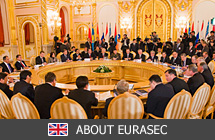
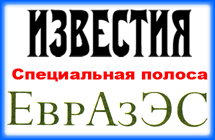
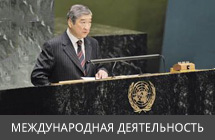
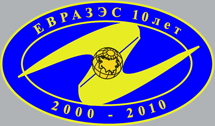
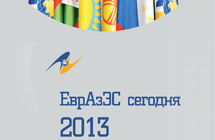
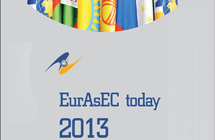
Поиск 10.10.2014 Заседание Межгосударственного совета ЕврАзЭС07.10.2014 Мультимедийная пресс-конференция в агентстве «Россия сегодня»03.10.2014 Встреча с Послом Финляндской Республики04.08.2014 Встреча Генерального секретаря ЕврАзЭС с Послом Республики Таджикистан20.06.2014 Премии Петербургского международного юридического форума «За вклад в развитие правовой интеграции на евразийском пространстве»28.05.2014 Договор о Евразийском экономическом союзе – важнейшее событие в новейшей истории наших стран25.05.2014 Презентация книги «Евразийский проект Нурсултана Назарбаева, воплощенный в жизнь. К 20-летию евразийского проекта 1994–2014»24.05.2014 VII АСТАНИНСКИЙ ЭКОНОМИЧЕСКИЙ ФОРУМ. Панельная сессия «Евразийской экономической интеграции – 20 лет. Итоги и перспективы»24.05.2014 VII Астанинский экономический форум и II Всемирная Антикризисная конференция, 21-23 мая 2014 года, Астана24.05.2014 Петербургский международный экономический форум, 23 – 24 мая 2014 года, Санкт-Петербург |

Евразийское экономическое сообщество
ЕврАзЭС
-
Страны участники
 Беларусь
Беларусь
-
 Казахстан
Казахстан
-
 Кыргызстан
Кыргызстан
-
 Россия
Россия
-
 Таджикистан
Таджикистан
-
 Узбекистан
Узбекистан
-
 Молдова
Молдова
-
 Украина
Украина

